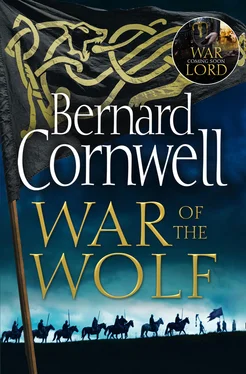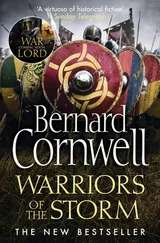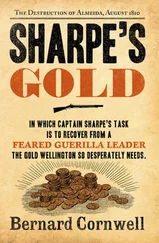Ælswyth had been captured alongside her father, and, after his death, she chose to stay at Bebbanburg rather than return to her family in Wessex. ‘You can’t,’ I had told her.
‘Why not, lord?’ she had asked. I had summoned her and she had stood in front of me, so young, so pale, so vulnerable, so enchantingly beautiful.
‘You can’t stay,’ I had spoken harshly, ‘because I have an agreement with your family. You will be returned to them when the ransom is paid.’
‘But the ransom isn’t paid, lord.’
‘Your father is dead,’ I had insisted, and wondered why she showed so little grief, ‘so there can be no more ransom. You must go home, as agreed.’
‘And your grandchild must go too, lord?’ she had asked innocently.
I had frowned, not understanding. My only grandchildren, my daughter’s two children, were in Eoferwic. Then I did understand, and I had just stared at her. ‘You’re pregnant?’ I finally said.
And Ælswyth had smiled so very sweetly. ‘Yes, lord.’
‘Tell my son I’ll kill him.’
‘Yes, lord.’
‘But marry him first.’
‘Yes, lord.’
So they did marry, and in time a child was born, a boy, and as is the custom in our family he was named Uhtred. Æthelhelm the Younger immediately spread a new rumour, that we had raped Ælswyth and then forced her into the marriage. He called me Uhtred the Abductor, and no doubt he was believed in Wessex where men were ever ready to believe lies about Uhtred the Pagan. It was my belief that the summons from Edward that had required me to travel to Gleawecestre to pay homage for my Mercian lands had been an attempt to bring me within sword’s length of Æthelhelm’s revenge, but why lure me across Britain to Ceaster? He would have known I would bring warriors, and all he would have achieved was to combine my forces with Æthelstan’s men, making the task of slaughtering either of us that much harder.
I had no doubt that Æthelhelm the Younger had committed treason by hiring Welsh troops to kill his nephew’s rival. But it made no sense that he would have persuaded the monk to tell me the lies that had brought me across Britain to Ceaster.
Beneath us, on the arena’s floor, the first prisoner died. A stroke of a sword, a severed head and blood. So much blood. Æthelstan’s revenge had started.
Not every prisoner died, Æthelstan showed more sense than that. He killed those men he judged to be close to Cynlæf, but spared the youngest. Thirty-three men died, all put to the sword, and I remembered a day when I had handed Æthelstan my sword and told him to kill a man.
Æthelstan had been a boy with an unbroken voice, but I was training him to be a king. I had captured Eardwulf, also a rebel. It had happened not far from Ceaster, beside a ditch, and I had beaten Eardwulf down so that he lay half stunned in the scummy water. ‘Make it quick, boy,’ I had told Æthelstan. He had not killed before, but a boy must learn these skills, and a boy who would be king must learn to take life.
I thought about that day as I watched Cynlæf’s men die. All had been stripped of their mail, stripped of anything of value. They shivered as, one by one, they were led to their deaths. Æthelstan must have remembered that distant day too because he used his youngest warriors as his executioners, doubtless wanting them to learn the lesson he had learned beside that ditch, that killing a man is hard. Killing a helpless man with a sword takes resolve. You look into their eyes, see their fear, smell it too. And a man’s neck is tough. Few of the thirty-three died cleanly. Some were hacked to death, and the old arena smelled as it must have smelled when the Romans filled the tiered seats and cheered the men fighting on the sand below; a stink of blood, shit, and piss.
Æthelstan had killed Eardwulf quickly enough. He had not tried to hack off the rebel’s head, but had instead used Serpent-Breath to cut Eardwulf’s throat, and I had watched the ditch turn red. And Eardwulf had been Eadith’s brother, and Eadith was now my wife.
Cynlæf died last. I thought Æthelstan might kill the rebel leader himself, but instead he summoned his servant, a boy who would grow to be a warrior, and gave him the sword. Cynlæf’s hands were bound, and he had been forced to his knees. ‘Do it, boy,’ Æthelstan ordered, and I saw the youngster close his eyes as he swung the sword. He slammed the edge into Cynlæf’s skull, knocking him sideways and drawing blood, but Cynlæf had hardly been hurt. His left ear was sliced open, but the boy’s blow had lacked force. A priest, there were always priests with Æthelstan, raised his voice as he chanted a prayer. ‘Swing again, lad,’ Æthelstan said.
‘And keep your eyes open!’ I shouted.
It took seven blows to kill Cynlæf. Those of his men whom Æthelstan had spared would swear new oaths to a new lord, they would be Æthelstan’s men.
So the rebellion was defeated, at least in this part of Mercia. The fyrd, dragged from their fields and flocks, had gone to their homes leaving only melting snow, the ashes of campfires and Gruffudd’s Welshmen who waited beside Cynlæf’s tents.
‘He calls himself a king,’ I told Æthelstan as we walked towards the tents.
‘Kingship comes from God,’ Æthelstan said. I was surprised by that response. I had merely been trying to amuse him, but Æthelstan was in a grim mood after the killings. ‘He should have told us he was a king last night,’ he said disapprovingly.
‘He was in a humble mood,’ I said, ‘and wanted a favour. Besides, he’s probably king of three dung heaps, a ditch, and a midden. Nothing more.’
‘I still owe him respect. He’s a Christian king.’
‘He’s a mucky Welsh chieftain,’ I said, ‘who calls himself a king until someone who owns two more dung heaps than he does comes and slices his head off. And he’d slice your head off too if he could. You can’t trust the Welsh.’
‘I didn’t say I trusted him, merely that I respect him. God endows men with kingship, even in Wales.’ And, to my horror, Æthelstan stopped a few paces from Gruffudd and bowed his head. ‘Lord King,’ he said.
Gruffudd liked the gesture and grinned. He also saw his son who was still guarded by Folcbald and Oswi. He said something in Welsh that none of us understood.
‘Gruffudd of Gwent begs you to release his son, lord Prince,’ Father Bledod translated.
‘He agreed to give us a name first,’ Æthelstan said, ‘and his chain, and a pledge that he will keep the peace for a year.’
Gruffudd must have understood Æthelstan’s words because he immediately took the gold links from around his neck, handed them to Bledod, who, in turn, gave them to Æthelstan, who immediately handed the chain to Father Swithred. Then Gruffudd began telling a tale that Father Bledod did his best to interpret even as it was being told. It was a long tale, but the gist of it was that a priest had come from Mercia to talk with King Arthfael of Gwent, and an agreement had been made, gold had been given, and Arthfael had summoned his kinsman, Gruffudd, and ordered him to take his best warriors north to Ceaster.
‘The king,’ Æthelstan interrupted at one point, ‘says the priest came from Mercia?’
That provoked a hurried discussion in Welsh. ‘The priest offered us gold,’ Father Bledod told Æthelstan, ‘good gold! Enough gold to fill a helmet, lord Prince, and to earn it we simply had to come here to fight.’
‘I asked if the priest was from Mercia,’ Æthelstan insisted.
‘He was from the sais ,’ Bledod said.
‘So he could have been a West Saxon?’ I asked.
‘He could, lord,’ Bledod said unhelpfully.
‘And the name of the priest?’ Æthelstan demanded.
Читать дальше












